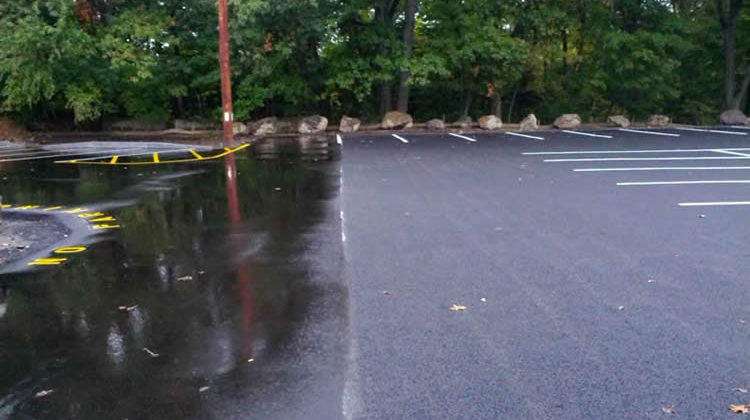SWAMPSCOTT — If you ask the director of the Swampscott Conservancy and Climate Action and Resilience Committee member Richard Frenkel, sometimes you need to think outside the box to beat the summer heat.
According to Frenkel, the committee has been workshopping new ideas to determine a solution to reduce the heat accumulating on asphalt and improve the stormwater runoff, improve water quality, and that can be used in a variety of ways in residential land and town properties.
He explained how he first came upon the solution trying to figure out ways to reduce the heat of the asphalt on his personal property.
“I have a driveway that goes up the side of my house, with a parking lot in the back of the house, and that is facing south, so in the summer it becomes a regular heat-sink, and radiates heat… So I was looking for ways to mitigate that and came across a product called ‘Cool Seal’ which reduces the temperature of the asphalt by at least ten degrees,” Frenkel explained.
Frenkel noted it can be used as an alternative to regular asphalt sealing coats. After calling the manufacturer, he learned it preserves the asphalt since it tends to crack up less without the heat buildup, hence reducing the maintenance requirements for asphalt.
The company Frenkel referred to, through which he learned of the product, was CoolSeal by TopGuard.
“But they don’t really sell them in small amounts. One has to order it in large quantities of a 250-gallon drum,” Frenkel said. “And I know that, in Swampscott, the town has had programs where it buys things in bulk, like rain barrels — so I figured it would be good for this kind of program as well.”
He reiterated that both the Swampscott Conservancy and the Climate Action Resilience Committee were interested in pursuing this as a possible program for the town to adopt.
Another possible solution that Frenkel said had been talked about by the committee was permeable asphalt. “This allows water to flow through the asphalt rather than accumulating on top of it. And I’ve talked with a paver, and it was said they would have to switch from regular asphalt to the permeable asphalt, but can do it with as little as 250-gallons (again),” he said.
“It reduces the amount of runoff, and the water soaks into the soil locally, instead of running off into the sea,” he said. “I figured I’d see if I get enough interest from people to buy the supplies, and I put together a form that lets people sign up online if they’re interested.”
For any resident who may be interested, the link to Frenkel’s online form can be found at https://docs.google.com/forms/d/e/1FAIpQLScttX8lihnapIU0vty_HpCYXIKdrE1pLEA0kJp_Tsopu3QU-Q/viewform.
“I have at least one paver that’s perfectly willing to do this… They wouldn’t be able to start applying the sealer until June, but they could do the permeable asphalt anytime,” he said. “The idea is to get a sufficient amount of people together in support of it, so that we can take the next steps.”

